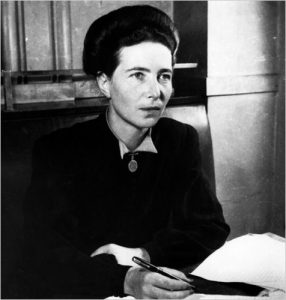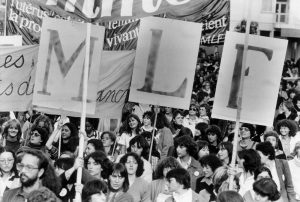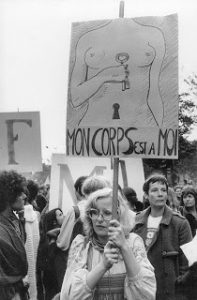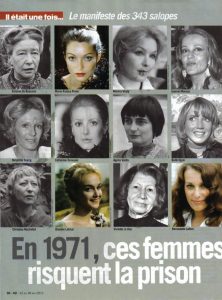Mouvement de Libération des Femmes (Women’s Liberation Movement), 1968
“One million women in France have abortions every year. Condemned to secrecy, they do so in dangerous conditions, while under medical supervision, this is one of the simplest procedures. Society is silencing these millions of women. I declare that I am one of them. I declare that I have had an abortion. Just as we demand free access to contraception, we demand the freedom to have an abortion” – Manifesto of the 343
The French Mouvement de Libération des Femmes (Women’s Liberation Movement), referred to as MLF, was one of the first groups of the new women’s movement in France. The MLF was founded in May 1968 by Antoinette Fouque (1936-2014) in the context of student and worker uprising of that year. Another influential leader in the Mouvement de Libération des Femmes was Simone de Beauvoir (1908-1986), a well-known female activist of the time and the author of the feminist bestseller Le Deuxième Sexe (The Second Sex), published first in 1949, which became very influential in the developing new women’s movement far beyond France.
During an interview in 1972 de Beauvoir, outlined the demands of the MLF: “The right to manage our own bodies, the collectivization by the state of all social services currently provided for free by housewives, collective education of small children, [and] equality of work with no sex discrimination.” In addition to these demands, the MLF called upon all French women to actively participate in the movement and defend themselves. The MLF was particularly dedicated to educating women about their social condition and encouraged them to take action.
A distinct feature of the Mouvement de Libération des Femmes was its insistence on a strategy of “autonomy”: its attempt of a separation from male-dominated parties and organizations. They saw subordination of and discrimination against women not only in the social, economic and political realm, but also in the organizations of the New Left. While male activists in the student and workers movement of the time wrote articles and served as spokesmen in the public, women were left to perform more trivial tasks away from the public eye. As a result of this treatment, young women formed all-female groups. Simone de Beauvoir noted in the interview that for women to achieve the goals of the MLF, had to “come to realize their objective condition.” By organizing in autonomous, all women organization, women took a step towards recognizing and opposing their subordination.
Another significant characteristic of the Mouvement de Libération des Femmes was its clear call to action. According to Simone de Beauvoir, she and other women internalized the movement’s slogan: “change your life today. Don’t gamble on the future, act now, without delay.” Through their actions, marches, and demonstrations, this new generation of militant feminist activists redefined what it meant to be a feminist. Feminists, according to De Beauvoir, became “women or even men too—who are fighting to change women’s condition, in association with the class struggle, but independently of it as well.” She recognized that achieving socialist goals did not necessarily lead to women’s liberation, but that they would have to take matters into their own hands by forming women’s organizations, refusing to marry, and working outside the home. The most crucial way that women were called to action was to work collectively to help each other and to advocate for their own rights.
One of the primary goals of the Mouvement de Libération des Femmes was to legalize abortion, which was outlawed in the French Penal Code. In 1971 the MLF published the “Manifesto of the 343” (manifeste des 343), criticizing the French Penal Code, according to which women at that time could only legally have an abortion if their lives were in danger. The 343 women who signed the manifesto admitted publicly to having had an abortion, thereby exposing themselves to criminal prosecution. The manifesto appeared in the French magazine Le Nouvel Observateur on April 5, 1971. The manifesto brought national attentional to the issue over abortion, by stating: “Do we have the right in France today, in a country that prides itself on being civilized to send women to prison for having taken into their own hands the control of their own bodies, or for having helped one of their own bodies, or for having helped one of their own do the same?”
This articulation of their cause connected the right to abortion with the freedom of women to make decisions about their own bodies. This MLF action inspired a manifesto by 331 doctors declaring their support for abortion rights on February 3, 1973: “We want freedom of abortion. It is entirely the woman’s decision. We reject any entity that forces her to defend herself, perpetuates an atmosphere of guilt, and allows underground abortions to persist ….”
Ultimately, the Mouvement de Libération des Femmes brought about lasting change to the notion of feminism and women’s rights movements. Today, women and men continue to participate actively in feminist movements through the use of marches, media, writing, art, and other sources of expression. While the Women’s Liberation Movement may not have resulted in complete liberation for women, it reinvigorated the idea that women need to support and work with each other.
Kate Nicholson, Biology and History double major, Class of 2019
Sources
Literature and Websites
- “Manifesto of 343.” Wikipedia, at: https://en.wikipedia.org/wiki/Manifesto_of_the_343 (Accessed 23 April 2018).
- “The History of Feminist Movements in France.” Françoise Picq, at: http://francoisepicq.fr/the-history-of-feminist-movements-in-france/ (Accessed 23 April 2018).
- Allen, Ann T. Women in Twentieth-Century Europe, 115-131. Basingstoke and New York: Palgrave Macmillan, 2007.
- De Beauvoir, Simone. “I am a feminist.” In Lives and Voice: Sources in European Women’s History, ed. Lisa Dicaprio and Merry Wiesner, 564-573. Boston: Houghton Mifflin Company, 1994.




